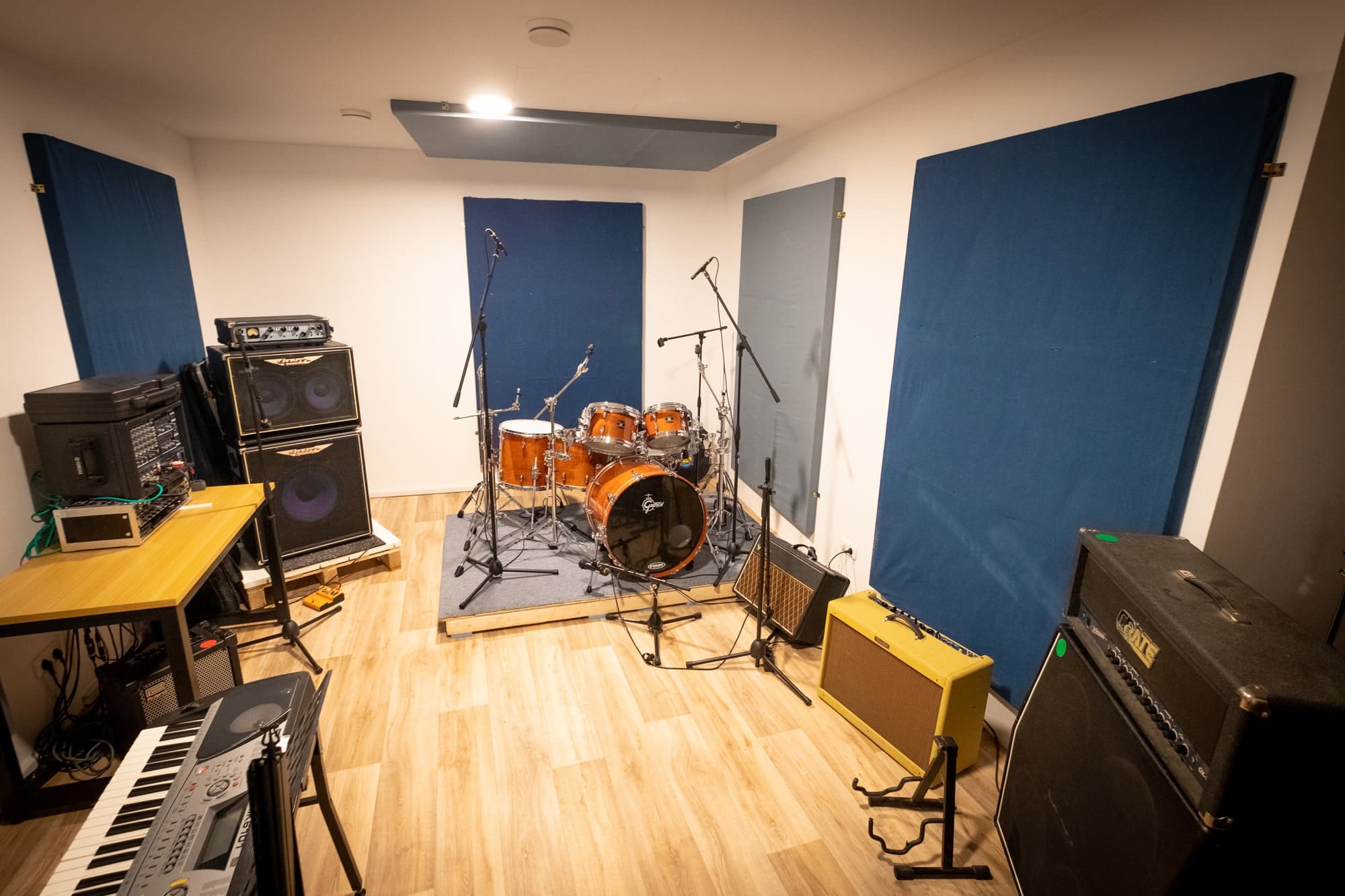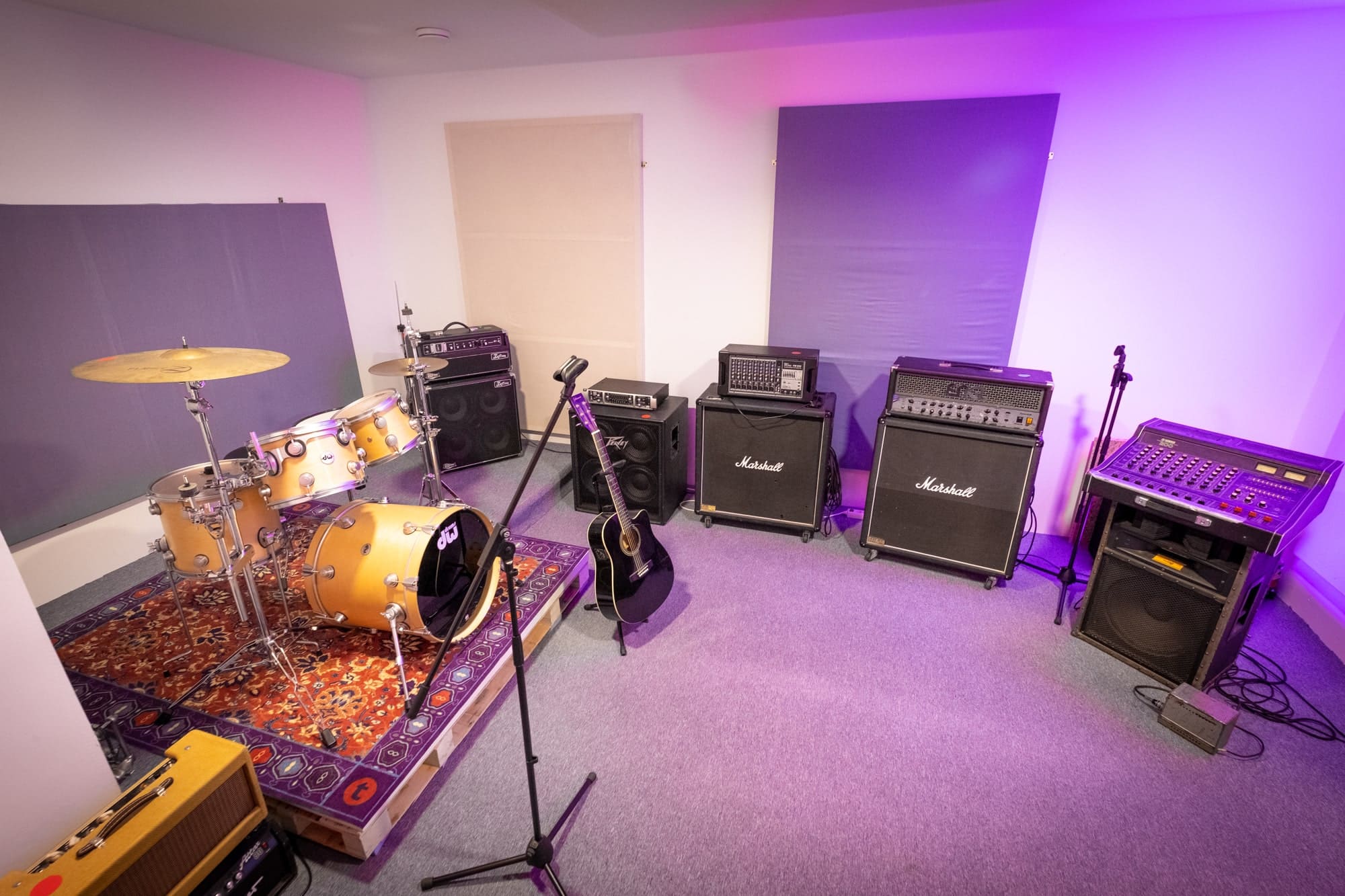Using Nexudus to Manage a Rehearsal Space
As a leading coworking management platform, Nexudus works with a variety of interesting spaces around the world every day, each with its own identity, story, and niche. Sound Animal is one such space. Based in Munich, the 154sqm building is home to four flexible rehearsal studios—and the 100+ musicians who utilise them.
Bakir Kreso is the founder. As a musician himself, he knows how painful it can be to find a well equipped, centrally located, soundproof rehearsal space to practice music. He created Sound Animal with the help of two friends with the aim of enabling local musicians to live their passion by providing access to a flexible solution.
From Google Calendar to maximum functionality
Initially, Bakir and his team relied on Google Calendar to manage studio bookings. He quickly realised, however, that he’d need a more comprehensive and integrated solution.
“The majority of our members don’t use our space for work; music is their hobby and they use the studios in their leisure time. So when we first started the business we used Google Calendar to let members keep track of availability,” Bakir explains.
With a growing membership body and four equipped studios to manage, Sound Animal found that it was unable to keep track of bookings; an issue that was proving to be time-consuming and one that could potentially compromise safety and security. In other words, they were operating on a trust-based system.
“Trust is a great thing but it’s not scalable,” acknowledges Bakir. “Now, with Nexudus, we have a perfect management system that makes everything very transparent. We know how many hours an individual has left and members know how many they have.”

Bakir also notes that the level of flexibility Nexudus affords is somewhat unusual for the music space industry. As far as he knows, Sound Animal is “the first music rehearsal studios provider that has a professional member management system like Nexudus”, which is why new members are often “completely blown away by its functionality”.
“Every time I show a solo musician where they can make a booking, see the rehearsal studios, cancel a booking and check how many hours they have left, they're so impressed,” Bakir says. “I’m also finding that bands love that they’re able to cancel a rehearsal and get a new spot without having to call the studio.”
The majority of Sound Animal’s members engage with the Nexudus Passport app and use it to manage their bookings, enabling Bakir to focus more on the strategic side of the business.
Studios contain musical equipment and members come from a range of musical backgrounds.
One of Bakir’s favourite Nexudus features is the integration with GoCardless. In Germany it’s uncommon for people to pay for memberships using credit cards so Sound Animal needed to be able to facilitate SEPA withdrawal payments. The integration is “going really well” and Bakir finds it reassuring to know that he has a reliable system in place.
Future plans: SALTO integration & NexBoard
Bakir’s short-term vision is to leverage Nexudus’ integrations further by implementing SALTO Systems to enhance access control. Sound Animal currently operates using a key box system whereby every time a member makes a booking they get a key code sent to them.
"This works okay but there’s always friction when, for instance, somebody forgets to leave on time,” Bakir explains, adding that he sees the project as a “worthwhile investment that will further set us apart from the competition.
Once introduced, members will gain access to the studio automatically for the duration of their booking and the door will lock when they leave, enhancing security.

Sound Animal also plans to give its members more options within NexBoard. “We do have tablets inside the studios and we’re looking to give members more options with the NexBoard over the next few months. We’re also building a hangout area where people can meet so it’ll make sense to have NexBoard available there too.”
As a startup, Sound Animal is continuing to experiment with new membership options and services. “That’s why we chose the Nexudus platform. It’s the most flexible solution on the market which means we can try out new things without being limited by our system.”
Related stories
Liz Elam: ‘Community is the number one amenity in coworking spaces’
A household name in the global coworking industry, Liz Elam, is the founder of one of the world’s best coworking event series: GCUC. Liz’s coworking roots began in 2010, when she established Link Coworking – a welcoming, affordable, and professional coworking space – in her hometown of Austin, Texas. Link Coworking achieved incredible success, expanding across three locations and becoming the fourth-largest coworking brand in Austin. It was sold in 2019, making Liz the first woman globally to exit a coworking brand.
Key Takeaways from the Coworking Alliance Summit 2025
Gathering online for the Coworking Alliance Summit last week, members of global coworking alliances, coworking spaces, and community leaders came together to navigate global issues, strengthen ties across the coworking industry, and work collectively towards future goals.
5 Ways to Reduce Noise in Open Offices & Coworking Spaces
Some people like working against a background of noise, while for others it’s their worst work nightmare. The truth is, our relationship with noise depends on our own preferences and the nature of our work.
Key takeaways from the Workspace Design Show 2025
London’s Workspace Design Show is undoubtedly one of the best coworking events of 2025. For one, the exhibition (held at Islington’s Business Design Centre) features a host of innovative and creative workspace design solutions tailored to the needs of modern workplaces.
What Is Workplace Management and Why Does It Matter?
There has always been a need for workplace management – the process of organising and optimising physical spaces, resources, and operations to support people’s needs. But, as 28% of UK working adults were reported to work in a hybrid capacity last autumn (by the Office for National Statistics), the question of ‘why workplace management matters’ is more critical than ever. Let’s look at the workplace management benefits for your operations.
10 Smart Goals for your Coworking Space: How to Set & Achieve Business Objectives
Coworking is synonymous with creativity, collaboration and productivity. Businesses and freelancers love coworking spaces because (by surrounding themselves with fellow workers) they’re more likely to achieve their goals. The coworking environment, while social, is set up to facilitate focused, distraction-free working.
The Best Coworking Events in 2025: Must-Attend Gatherings for Professionals
Managing coworking spaces is an all-encompassing role, often leaving operators, owners, and community managers with little time to focus on personal growth or draw inspiration from others.
10 Award-winning Coworking Space Designs: A Comprehensive Guide
Vibrant, contemporary workspaces create an undeniable ‘wow’ factor. Textured designs and ambient lighting make spaces feel warm and cosy, while natural elements and biophilic design features have literal mood-boosting properties.
The Power of People: Building a World-Class Team in Coworking
Coworking spaces thrive on the “co” – the collaborations, connections, and community – that can be formed within a flexible workspace. In fact, community activation is what transforms shared workspaces from mere buildings into vibrant, thriving hubs that empower people in their professional lives and create meaningful community experiences.
6 Powerful Storytelling Techniques to Elevate Your Coworking Space
If you've been reading about coworking space design recently, you've probably come across an article or two that mentions narrative design and wondered what exactly it is and how it differs from traditional interior design, as well as how it can be used to improve design.

